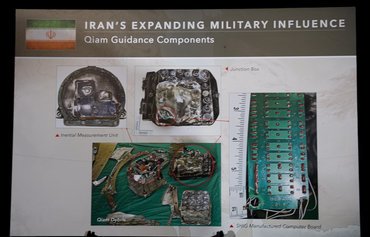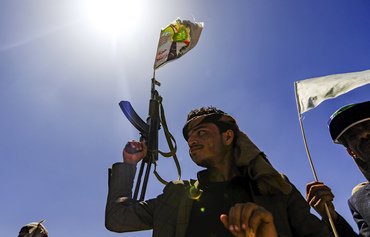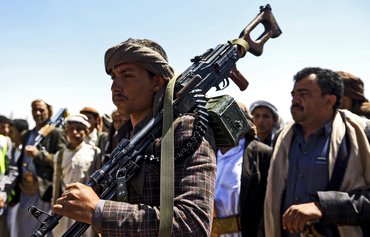The death of Iranian experts confirms Iran's continued intervention in Yemen and the threat this poses to regional security and the lives of civilians, officials and experts say.
Local media reported on June 17th that Iranian experts and members of the Iran-backed Houthis (Ansarallah) were killed as the ballistic missile they were trying to launch from al-Dilmi air base near Sanaa airport exploded.
The Houthis had turned al-Dilmi air base into a military barracks for their elements and a base to launch attacks using unmanned aerial vehicles (UAVs) and ballistic missiles.
Iran has been supplying the militia with UAVs which it is smuggling into Yemen via two units of the Islamic Revolutionary Guard Corps' Quds Force (IRGC-QF), according to a study by the Abaad Centre for Strategic Studies published in January.
Officials and experts said the incident confirms Iran's wanton behavior toward the countries of the region, its continued smuggling of arms to the Houthis and disregard for the lives of civilians in Yemen and neighbouring countries targeted by its missiles.
"Launching missiles from inhabited areas or their vicinity is a war crime as it jeopardizes the safety of civilians," lawyer and human rights activist Abdel-Rahman Berman told Al-Mashareq.
Missile attacks turn those areas into a military target, he said, and turn "innocent residents into human shields and endanger their lives".
Iranian and Hizbullah experts
"There is no question about the presence of Iranian experts and military personnel and Hizbullah experts in Yemen to support their Houthi allies," Berman said.
"These experts are training the Houthis on launching missiles and also take part in their launch," he said, noting that Iranian experts have been killed in failed launches on more than one occasion.
Other evidence confirms Iran's interference in Yemen, he said, including the 2013 arrest of the crew of Jihan 1, an arms-laden cargo ship from Iran, that was smuggling arms to the Houthis before the war. Yemeni members of the crew were jailed in Sanaa before they got released by the Houthis when the militia took over the capital.
Berman said the smuggling of arms, missiles and UAVs is continuing non-stop and their use in the fighting "confirms the extent of the Iranian intervention and the fact that they clearly have their fingerprints all over this war".
"Houthi militiamen are primitive fighters who use conventional weapons, so the advanced weapons are handled with the help of Iranian experts," he added.
Threat to the region
"The launch of missiles from residential areas and civilian facilities endangers the lives of civilians, and this is but one chapter in the history of crimes perpetrated by the militias, which have total disregard for the lives and safety of civilians," said Deputy Minister of Human Rights Nabil Abdul-Hafeez.
The presence of Iranian and Hizbullah experts "is clear evidence of the strategic activities carried out by Iran and its affiliates" to expand their influence in the region, he said.
This includes the direct targeting of vital facilities in Saudi Arabia and the attacks on tankers in the Gulf of Oman blamed on Iran and its affiliates.
"Iran’s fingerprints are on the missiles and UAVs, as well as the naval mines that targeted international ships," journalist Faisal Ahmed said, adding that this is evidence of Iran's smuggling of Iranian weapons to the Houthis.
Ahmed urged the international community to respond to the danger posed by the Houthis and to support the legitimate government in accordance with UN resolution 2216.
The UN resolution calls on all parties to immediately and unconditionally end violence. It calls for the Houthis to withdraw from all areas seized during the current conflict, relinquish arms seized from military and security institutions, and cease all actions falling within the authority of the legitimate government.
Iran's intervention in Yemen has become indisputable, Ahmed said, "and putting an end to this intervention is a task for the international community".

![Brian Hook (2nd R), the US special representative on Iran, checks what Saudi officials said were Iranian-made Houthi missiles and drones intercepted over Saudi territory and the remnants of a "cruise missile" that slammed into Abha airport on June 12th, during a visit to an army base in al-Kharj, south of the Saudi capital Riyadh, on June 21st. [Fayez Nureldine/AFP]](/cnmi_am/images/2019/07/03/18787-iran-missile-saudi-600_384.jpg)







Yes, Iran is supplying Houthis with weapons. Iran’s policy is dangerous. It can conclude deals with Houthis about selling them weapons. This is the same thing that China, America and all industrial countries across the world do. We shouldn’t forget that President Ali Abdullah Saleh, who was killed at the hands of the supporters of Abdul Malak at Iran’s and America’s orders, had given them access to the state’s weapons stockpiles. However, what is suspicious here is that Saudi Arabia has more and bigger and more advanced weapons than the Houthis and Yemen. From my follow-up of events until now, I can say that Iran and Houthis know how to play well in foreign, military, and legal policies, while Saudi Arabia is a failure in its foreign, domestic and military policies. We pray to God to quell the fire of war, give victory to truth, and defeat all those who have conspired against Yemen and all Muslims. God suffices us and He is the best disposer of affairs!
Reply2 Comment(s)
May God damn the liars among you!
Reply2 Comment(s)